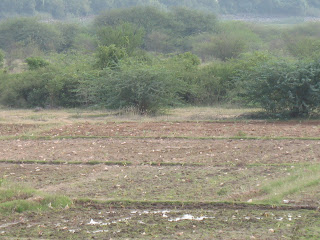I have recently made several postings on the Eucalyptus Tree and its cultivation in the Tiruvannamalai District. There is no doubt that the Eucalyptus is a fantastic tree with a host of ayurvedic properties and benefits – but perhaps it would have been better to have left the tree in its native Australia and Tasmania. Already there are several Eucalyptus plantations around Samudram Lake, (south of the Hill) which is probably not a good decision considering severe water shortages often experienced in this area.
**************************************************

"The recent move of the Tamil Nadu Forest Department to reintroduce large-scale cultivation of Eucalyptus trees in the State invites stiff resistance from environmentalists on the ground it would create ecological imbalance.
Experts have raised concern over the extensive cultivation of this species. “Monoculture of Eucalyptus cannot be recommended. If the intention of the Forest Department is to increase forest cover in the State, it should plant indigenous species of trees and herbs and maintain the bio-diversity of the region,” said a representative of the Tree Foundation. In a study on ‘Eucalyptus in India,’ it was pointed out that extensive cultivation of Eucalyptus was introduced in the country in the 1960’s. Since then some of the States took advantage of the centrally sponsored scheme and raised Eucalyptus plantations by felling even moist deciduous forests.
The Forest Department wants to increase the forest cover in Tamil Nadu from the present 23,023 sq km (21.25%) to 33%. To achieve this target, it will have to promote social forestry on at least 20% of the total 75 Lakh hectares owned by them. “This project is to be carried out on privately owned land and trees will be grown like any other cash crop. Earlier the mass cultivation, was carried out on land possessed by the Government and hence there was an uproar against it,” said a representative of World Wide Fund for Nature.
Others believe that growing Eucalyptus in ‘vulnerable zones’ like arid areas, will destroy the hydrological balance of the region. The tree is water intensive and reduces water available for other species, effectively out-competing them. Particularly vulnerable are arid areas with annual rates of precipitation that correspond to the lower range of eucalyptus demand at about 700 mm.
Studies have revealed that in arid areas, the consequent suppression of other plant life, coupled with a high water demand, reduces soil moisture, preventing the recharge of groundwater and can reduce local water tables. This is exacerbated by a high transpiration rate indicative of the inefficient use of water. Being nutrient intensive, it creates deficits for other plant life, a process that is exacerbated by the low returns in leaf litter to the soil. It does not contribute to the long-term fertility of the soil, as other species might, resulting in an overall nutrient impoverishment of the soil.
Eucalyptus is toxic, due to allelopathic properties which inhibit the growth of other plants due to bimolecules released by it. The plant also is detrimental to soil micro and macro fauna."
[With thanks to G.G. Jens]



